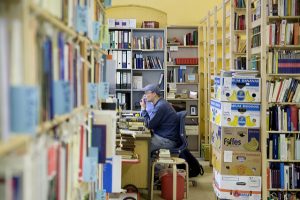Arno Görgen*, Rudolf Inderst** und Eugen Pfister*** im Gespräch mit Nina Kiel**** &n...
Open Access: Surfschule IHA-CREPOS in Dakar
Blick aus dem Büro des IHA-CREPOS an der Corniche in Dakar Wenn ich nicht schon Anhängerin...
Open Access: Surfschule IHA-CREPOS in Dakar

Blick aus dem Büro des IHA-CREPOS an der Corniche in Dakar
Wenn ich nicht schon Anhängerin von Open Access wäre: spätestens in Dakar würde ich es werden. Weit weg von europäischen Städten mit hoher Bibliotheksdichte und vielen teuer bezahlten Online-Abonnements wird einem die Bedeutung eines freien Zugangs zu Literatur und Information mit sehr viel größerer Dringlichkeit bewusst. Sicherlich: das Internet muss erst mal funktionieren, was auch keine Selbstverständlichkeit ist. Aber wenn man dann im Internet surfen kann (Achtung: Clickbait-Titel, denn „im Internet surfen“ sagt ja wohl keiner mehr…) dann freut man sich über jede Rezension, jeden Artikel, jedes Buch, jede Datenbank und sämtliche frei nutzbaren digitalen Infrastruktureinrichtungen für die Geisteswissenschaften. Denn nicht nur können sich im Senegal wie im übrigen Westafrika die Bibliotheken viele elektronische Angebote der Großverlage nicht leisten, auch im gedruckten Bereich sieht es schwierig aus, denn die Bücher müssen ja erst mal in Dakar ankommen…
Zotero als Nachweisinstrument und kollaborativer Dokumenteverwaltung
Die internationale Forschungsgruppe des DHIP zur „Bürokratie im subsaharischen Afrika (19.-20. Jh.)“ existiert seit Januar 2017, basierend auf einem Vorprojekt, das seit November 2015 läuft.
[...]
Nordkoreanische Zwangsarbeit in der EU – Der lange Arm des nordkoreanischen Diktators
von Markus Pohlmann Wenn am 22. Juni 2018 das WM-Spiel Brasilien gegen Costa Rica ausgetragen wird o...
Gegen ein „Loch“ am Sachsenhäuser Ufer. Ein kommunaler Ideenwettbewerb an der Dreikönigskirche in Frankfurt am Main 1915 und 1927
Die Frankfurter Dreikönigskirche ist entblößt! Ohne umliegende Bebauung steht das ev...
2018-04-23/25, Antwerp — the first Federated-Wikibase-Workshop
Thanks to the initiative of Andra Waagmeester and Daniel Mietchen (who are part of the community that is behind Wikidata incorporating such staggering inputs as the complete human genome) we ventured a first workshop of projects that have begun to use the Wikibase software outside the original Wikimedia/Wikidata environment. The event at Antwerp’s fifteenth-century hospice, now the Elzenveld hotel and conference centre, was generously funded by the European Research Council. The participants came from fields which only this software would bring together: the natural sciences, the humanities, the social and political sphere and Wikimedia. Wikidata, the Wikimedia project in the centre, is about to become the broadest compound in the world of collaboratively produced knowledge. Starting with interconnecting the 290 Wikipedias all around the globe it became able to switch between all their respective languages. Knowing all the equivalents of articles as well as all the unique items which individual communities created on their Wikipedias Wikidata is closer than any comparable compound to theoretically knowing what a father, a cat, a religion or a novel structurally is. The multilingual competence is matched only by the database’s openness to all sorts of items: Wikidata is dealing with bacteria, the Mona Lisa, Chinese politicians, obscure philosophical concepts, mathematical equations, individual genes, geo-coordinates, and all sorts of properties and qualities these items can gain. The software is open to the flexible creation of ever new properties interconnecting the bricks. You can read Wikidata on the Reasonator and you can explore Wikidata with machines. It is open to logic, accessible in ever new SPARQL queries – the search language worth learning.
[...]
Schools Facing Public History
The public uses of history compete with school teaching from a position of strength, and therefore they must become part of school history curricula in order to give pupils the tools to critically evaluate them.
The post Schools Facing Public History appeared first on Public History Weekly.
Quelle: https://public-history-weekly.degruyter.com/6-2018-16/schools-facing-public-history/
Political Aberrations
When the politician Roman Haider of the party FPÖ (Freedom Party of Austria) caused the interruption of a lecture about political extremism in an Austrian school in spring 2017, a heated debate erupted over the place of politics in school education. The controversy raises important questions over the aims and principles of civic education.
The post Political Aberrations appeared first on Public History Weekly.
Quelle: https://public-history-weekly.degruyter.com/6-2018-16/political-aberrations/
„New Work“und alte soziale Probleme. Eine Reflektion von Klaus Janowitz
Klaus Janowitz (http://www.klaus-janowitz.de/) entwickelt in diesem Beitrag (welcher Teil von Winfri...
NEUE REZENSIONEN: H-SOZ-KULT
Berliner Büchertisch – Bucherfassung, Berlin, 3.2.2010. Quelle: Flickr, Lizenz: CC BY-SA 2.0
Kerry Wallach: Passing Illusions: Jewish Visibility in Weimar Germany
University of Michigan Press, Ann Arbor 2017
Rezensiert von Stefan Hofmann, redaktionell betreut durch Björn Siegel
Für die historischen Erfahrungen der Juden spielten Fragen der Sichtbarkeit von jeher eine herausragende Rolle.
[...]
Quelle: https://www.visual-history.de/2018/05/02/neue-rezensionen-h-soz-kult-8/
